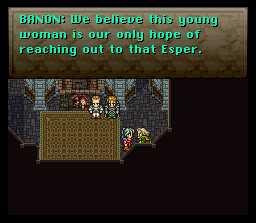
The Characters of Final Fantasy VI
by Merlin
For me, the main reason to play a role-playing game is its plotline. First person shooters I play for intensity, platformers are played for gameplay, and puzzle games…well, I don’t really play puzzle games. But is not the essence of RPGs their stories? What they have to tell you? You’d likely be hard-pressed to find someone who’s favorite RPG did not possess a story that they did find personally appealing, compelling, interesting or almost literary.
But, these are not called Story Games or Almost-Book Games. They are role-playing games. Unless your character wears a green hat and fights rock-spitting octopi the idea of an RPG is that there is some sort of interaction going on between you and the characters you are controlling. You obviously manipulate and dictate their actions but to a certain degree they also influence and impact you. The best characters at least achieve that particular accomplishment. And since an RPG is above-all a “role-playing game” then the inference is that they are games who’s value can be judged based on how good a narrative is related, which in this particular genre is told through the perspectives of multiple personalities.
Unfortunately, most games struggle with this ability. Narrating a tale through nuanced characters is no mean feat, ask any struggling author. Certain games abandon the very depth of the phrase “role-playing,” and while they may successfully create an enjoyable game, there is very little to remember after playing it; I’m looking at you, Final Fantasy V! Even most good RPGs end up settling for painting broad brushstroke characters that, while interesting, are ultimately singularly faceted. The personalities of the vastly underappreciated Deus Ex fit this criterion, where (the protagonist excepted) there is not much time or even interest devoted to expanding characters’ depth. Still other games may try to develop a well-rounded, diverse cast who deliver the story’s narrative well, but it is rare that this is long-maintained. Final Fantasy VIII fought valiantly for a disc and a half, but the plot tumbled into mediocrity soon after the assassination attempt of Edea.
Final Fantasy VI develops the largest and most interesting cast of any RPG yet conceived. There are NINE characters that are absolutely brilliantly explored throughout the game’s journey, and you could argue that there are at least four other characters (Gau, Strago, Relm and Leo) that end up better characterized and interesting than some RPGs’ protagonists! And considering you can control as many as sixteen different characters throughout the game, this is quite the achievement for a cartridge-based game that existed before 3D graphics, let alone the prevalence of the CD-ROM. When it’s further realized that many of these sixteen characters would become the archetypes that subsequent developers (especially Square) hinged many of their characters and plotlines around, the importance of FFVI in the history of the RPG should become even more pronounced. I’m going to devote the rest of this essay trying to explore and expand the worth and impact of those nine characters I referred to: Terra, Locke, Edgar, Sabin, Celes, Shadow, Cyan, Setzer, and Kefka.
| Terra: The Beginning | |
| “But how will I know which way is right...” | |

| Terra begins the game as a slave, under control of the despotic Empire. As she is liberated, joins the “resistance” and as her past is gradually discovered it is learned she is half-human, half-“Esper,” the race of ancient magical denizens of the planet. Therefore a large portion of the resistance against the Empire (and later Kefka) revolves around Terra and her connection with the powerful Espers. This background is more than duplicated by a certain flower girl whose name begins with ‘A’ and ends with ‘eris,’ no? Like one of the game’s repeated themes, Terra is a girl unsure of herself and conflicted; as is likely anyone living in tyrannical times. These complicated dualities replicate themselves in her phases of the plotline. She has awkward feelings of compassion, but she’s been made to attack cities like Narshe. Her bloodline stretches back to the beginnings of time, yet she asks Leo about the nature of love. Even her special ability involves the morphing from one form to a second one. The game in a way can be said to truly revolve around her, even though a strong case can be made that she is not the main character (FF6, among other ‘bests’ is also likely the best ensemble RPG ever). She begins the game a slave, with no free will, no self-awareness, no ability to influence or be influenced by the world. But perhaps the most lasting impression of the game’s final cutscene is Terra bravely flying ahead of the airship, the wind streaming her hair behind her. Her dualism is resolved, she found her freedom. |
| Locke: The Hero | |
| "Hey! Call me a TREASURE HUNTER, or I'll rip your lungs out!" | |
| Locke is the traditional ‘hero’ character found in many movies, books, and video games. He is a swashbuckling ‘treasure-hunter’ who saves the damsels, fights for justice, and finds riches while doing it. Locke is best emblemized by his theme song, which just pulsates with Indiana Jonesesque melodic strains. He is one of the most used and important characters in the story, and Locke also is a central figure in the well-rounded “love triangle” (him, Terra and Celes) that first develops in FF6 and soon becomes practically a prerequisite for Square’s later RPG projects. He represents idealism. He’s a character trying to make the world better and be kind to people, while at least on the surface refusing to question his own or the world’s motivations. But, like many of our characters, there is more to him than these generalities. Locke’s had his own troubles in the past. He blames himself for the loss of his love Rachel, by faulting himself as not being able to save her he actually appears to be a more devastated soul. That is the reason why he constantly promises the women in the game that he’ll “keep them safe,” he’s unceasingly trying to absolve himself of what he sees as past sins. It also explains his penchant for “treasure hunting” as the Phoenix Cave vignette testifies. Despite his debonair veneer Locke is really a self-loather, he’s so nice to others because he secretly hates himself. Locke ultimately finds his personal redemption. While searching for the Phoneix magicite the apparition of Rachel confronts him. She tells him to stop blaming himself for the past, and to respect himself again. This allows Locke to rejoin the party, to confront Kefka with the words “I have learned to celebrate life…and the living” and thus finally becoming what everyone has come to expect: a hero. | 
|
| Edgar and Sabin: The Brothers | |
| "...Sabin, let's settle this with the toss of a coin. If it's heads, you win. We'll choose whichever path we want, with out any regrets. Okay?" | |
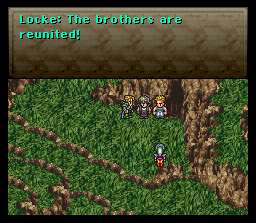
| Edgar and Sabin Figaro are two of the more popular characters in the game. This is because they are both introduced rather early, and are generally among the more powerful characters as far as gameplay, especially Sabin. Edgar is a relatively unsuccessful ladies’ man who also happens to run the patriotic realm of Figaro, which chooses to resist the Empire. Sabin is a secluded but well-trained hand-to-hand combatant, relatively thickheaded but friendly to allies and fierce to enemies. Both get caught up in the larger struggle against the Empire and Kefka, and it is through their participation that they rediscover each other. During the game they are able to rekindle their lost brotherhood through their cooperative struggle. When they are first reunited the player may ask themselves the question, why is Edgar in charge of Figaro but Sabin living the life of a martial monk? Is there bad blood between them, or a power struggle? It is retold via flashback that upon their father’s death the two brothers were at odds with how to face the future, especially because it was rumored the Empire had poisoned their dad. Sabin was furious and felt that he had to actively leave Figaro in order to resist this injustice, to go it alone. Edgar worried about the fate of the kingdom without them and felt a loyalty to the royal line. They decided to flip a coin; if it went Sabin’s way then the two brothers would just go their separate paths without any ill blood.
What is not learned until later is that Edgar cheated. The coin had identical sides. Edgar explains that he knew Sabin would only be happy if he left Figaro and was able to live his own life, free of responsibilities. Edgar became king out of love and respect for his brother. These two characters are two of the most unwavering characters to the cause. While most of the other characters go through moments of self doubt in the wake of the destruction of the World of Balance, Edgar and Sabin are still actively seeking to change the world. Sabin is found single-handedly preventing a home from collapsing while Edgar is discovered trying to unearth Figaro. Sabin is helping the world by going his own way, Edgar through aiding his kingdom against tyranny. But they are still brothers nonetheless. |
| Celes: The Center | |
| "You want to live in this world as it is? No? Then do something about it!" | |
| If I were to make a movie out of FF6 (it’d probably have to be a trilogy to actually do the story justice) I would likely make Celes the main character. After looking at the entire game, she appears to be the most human of all the incredibly multi-layered characters. A product of the Empire’s “super-soldier” program (she is infused with magitek); she becomes one of the greatest generals in the repressive army. She is there when experiments are conducted on Terra, and she is said to have razed Maranda. But she eventually turns her back on the Empire and begins to doubt its means and its ends. For this she is branded a traitor, beaten, and imprisoned. Celes is a deeply hurt and mistrusting character, which is the inevitable result from someone who becomes aware of the lies and mistruths of a system or idea you were previously so attached to. It takes Celes the rest of the game to reconcile herself with her past and to grow from it rather than be destroyed. For Celes, the vehicle of this growth is through earnest love. Her relationship with Locke goes in spurts, it is first hinted when he discovers her imprisonment, builds through their brief separation, and is ultimately affirmed in the game’s final acts. As Sephiroth Katana has already brilliantly analyzed, is the Opera scene not the most picturesque and emotionally tangible moment of the whole RPG genre, despite its relative irrelevancy to overthrowing the Empire? Celes is the face of hope in this cast of personalities. She was a leader of a rapacious and oppressive tyranny, she is fallen, but she is also capable of redemption and defiantly asserts this throughout the game’s final third. Symbolically Celes’ journey through the World of Ruin and her task of resummoning all the characters prior to the devastation is reflective of both her own and humanity’s progress through a conviction in hope. | 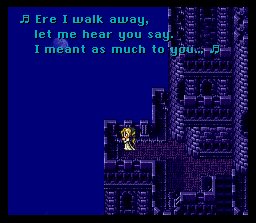
|
| Shadow: The Badass | |
| "Leave us. The dog eats strangers..." | |

| Shadow is the first truly “badass” RPG character I can discover. He is the beginning of a consistent theme in Square RPGs of singular characters who stand out through their laconic speech, geekish weaponry, and an almost gothic aura of “cool.” For example, every subsequent Final Fantasy from Vincent to Paine has at least one such character as part of the roster. One way in which Shadow particularly stands out is his relative indifference to the party for much of the game. Throughout a significant portion of the World of Balance, Shadow will unexpectedly join your party for a while, provide welcome reinforcement, and then just as inexplicably leave. This surface-level indifference to the party is even more pronounced by the fact that you have to perform a specific task in order for him to fight with you in the World of Ruin at all. His entrance or leaving is usually accompanied by a comment such as “the Reaper is always a step behind me,” his statements are generally the more memorable quotes in the game. Shadow’s motivations are generally highly-veiled and it’s left to conjecture as to why exactly he wishes to help, let alone who he is. Nonetheless, about halfway through the game a deeper personality to Shadow, more than just a generic badass varnish begins to emerge, which is what catapults him ahead of many similar characters. The beginnings of a subtle tenderness towards the child Relm is detected, which he covers up as concern for his dog Interceptor. In fact Shadow has a concern with all things innocent, he warns Terra not to kill her emotions like he has. This belies a deeper sense of inward guilt felt by Shadow, which is amplified by the fact that he sells his service to the Empire towards the end of the World of Balance. Their betrayal forces Shadow to reevaluate himself, and while he first refuses the help of the heroes, he comes to reconcile himself and his past through friendship and camaraderie with the others. The most intriguing moment of all concerning Shadow is during the game’s final escape sequence, I won’t delve into it, but it is one of the saddest yet also most redemptive moment in any video game. |
| Cyan: The Knight | |
| “I learned of that poor girl when I passed through Maranda. When I heard that she sent a letter each day, but never received any replies... Something inside me snapped...” | |
| Cyan is introduced through the most realistically devastating scene scripted in an RPG at that point in the genre’s history. He is the retainer of the kingdom of Doma, which is at war with the Empire at the game’s beginning. After General Leo is recalled and the siege of the castle is handed to Kefka, the lunatic decides to poison the land’s water supply. Cyan is one of the only survivors of this catastrophe, and as you guide his movement throughout the castle as the poison spreads, you witness spreading destruction through the royal family and Cyan’s own wife and child; an incredibly moving demonstration. Devastated over his inability to stave off the catastrophe (he in fact advised that they seclude themselves in the castle in the first place) he attacks the Empire’s troops in a suicidal rage, Sabin’s intervention saves Cyan’s life and gets the knight to join the organized resistance. Cyan spends most of the rest of the game wracked with guilt over Doma, this theme of self-incrimination is strong within our cast of characters, one thing that perhaps helps them become so multi-varied as well as influencing subsequent Square characters. Witnessing his wife and child leaving the Phantom Train does not help ease his guilt, and he feels incredibly indebted to the party, especially Sabin. But he grows and changes throughout the narrative. He nearly attacks the former general Celes when he first meets her, refusing to trust her. But later in the game, when confronted with Leo, a man who had a more direct involvement with Doma, Cyan recognizes that that the incident was not Leo’s fault. In time Cyan comes to terms with the fact that the tragedy was not even his fault, it is the creation of the pure evil of Kefka’s lunacy. Symbolically Cyan’s strongest sword ability is only learned after this fact is hammered home, both to him and the player. During his nightmare-sequence he is confronted by his wife and child, told that he was not responsible for their deaths and that he must move on. He affirms this, realizes he has to live in order to truly do their memory justice, and thus reclaims his honor, his fighting strength, and his own subjective self. | 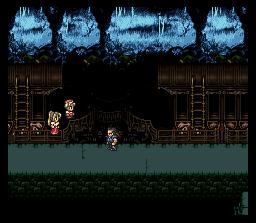
|
| Setzer: The Gambler | |
| “Nothing to lose but my life...” | |
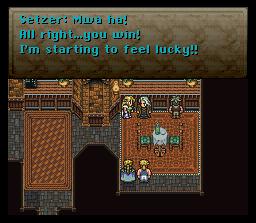
| Setzer is apparently the most carefree character in Final Fantasy VI. His cavalier attitude towards life and death is another archetype that frequently occurs in other RPGs and elsewhere within our pop culture. He is introduced as a roguish ne’er-do-well who works for anyone who can pay and who symbolically jets around the world in an airship, where no land is his home. Unlike the other party members, he is actually tricked into joining the group by Celes, who uses the same coin Edgar used to give Sabin what he wanted. While an appealing personality, he does not seem to be as strongly attached to the mission as the rest of the party, it is almost as if he’s combating the Empire simply because he has nothing better to do. He has even worked for the Empire, and when confronted with the party’s idealistic crusade he is more incredulous towards it than Shadow, cutting the discussion short to talk about something more tangible, like Celes’ beauty. Once he joins the party though he becomes aware of the inherent lies of the Empire (especially when Kefka betrays Leo and everyone at the Esper Gate) and becomes a more earnest combatant, until the World of Ruin. Overwhelmed with the devastation (he loses his airship The Blackjack too) he at first withdraws from the struggle, saying that the world is now even “too chaotic” for the gambler, that he wishes to be left alone. Convinced by Celes that humanity is still worth fighting for he reassumes the cause, even taking the party to the resting place of his lost love Daryl. The sequence here culminating with the retrieval of the airship The Falcon is the most touching moments for Setzer’s character. We realize that he too used to have stronger convictions and investments within other people until her mysterious loss, which caused him to turn insular and away from the world. But through his friendship with the rest of the party and through believing in Celes’ conviction in hope Setzer is able to turn himself around and once again become an actor upon the world. |
| Kefka: The End | |
| "I will destroy everything! I will create a monument to non-existence!" | |
| It is often the case that in the best creative works the villain often becomes one of the favorite or most memorable characters. Grendel, Iago, Brando’s Kurtz, Darth Vader, even Sephiroth of FFVII. There is something about villainy done well that stands strong in our minds. Kefka is one of the strongest video game characters ever written, and it is precisely because he is so immediately recognizable. The antithesis of our cast of nuanced, deeply written “good guys,” Kefka is simply a madman. He does not want to create, only destroy. He’s not after power, or wealth, or influence, or a twisted romance, the usual litany of evil ambitions; just simple destruction. His psychosis is not even an excuse through which to understand or compartmentalize Kefka. He is so insane that his actions become rational. He poisons Doma’s water, expels Celes, discredits and kills Leo, assassinates the Emperor. He logically and methodically centralizes and wields power despite being positively cracked. And he does it all with a wicked gleam in his eye and a well-translated taunt. It is not Locke or even Shadow who has the most submitted quotes on the FF6 section of RPGC’s quote archive, it is Kefka. His signature action in the game, his turning towards the camera and wagging his finger, is utterly diabolical and dares the game’s player to end his life. There is precious little to analyze about Kefka, any referenced scene involving him would likely only continue to demonstrate that he’s insane and evil. But that is exactly what makes him a good villain, perhaps the best of Square’s cast of malefactors. We aren’t supposed to dislike Kefka because of a poor childhood, a psychiatric disorder, or cruel ambitions that can be deconstructed. We loathe Kefka because he is loathing. We hate Kefka because he is hate. He is the accumulation of everything the other characters are resisting. They are trying to construct a world based around the interrelated need for friendship, compassion, and hope. Kefka wishes to burn all this down -- and the Kefkas of the world must be resisted by all of us, because they are the most dangerous kind of evil: the distrust of others, the disinterest in people, the pessimism towards everything. Kefka is evil for evil’s sake, and that is what makes him stand out in a game full of stand-outs. | 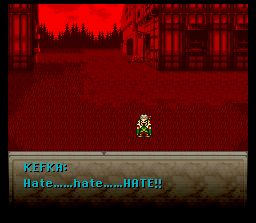
|
| Conclusion | |
| Perhaps the largest mark of this game’s greatness is the fact that despite the game’s age, its two-dimensional sprite graphics, and its other technical limitations, the game still stands in most RPG players’ minds as a peak of the genre. The main characters and personalities are a major component of the final product. It is through them that we examine the world of FFVI, understand its struggles and experience its triumphs. Perhaps the greatest summation of the characters’ plight, against both the unequal world they are forced into and against the lunacy of Kefka’s globally-destructive rage, is this final conversation that takes places near the end of the game, between our heroes and our villain: | |
| "I will exterminate everyone, and everything!" "People will keep rebuilding the things you take from them!" "Then I'll destroy those too. Why do people rebuild things they know are going to be destroyed? Why do people cling to life when they know they can't live forever? Think how meaningless each of your lives is!" "It's not the net result of one's life that's important! It's the day-to-day concerns, the personal victories, and the celebration of life ... and love! It's enough if people are able to experience the joy that each day can bring!" |
|